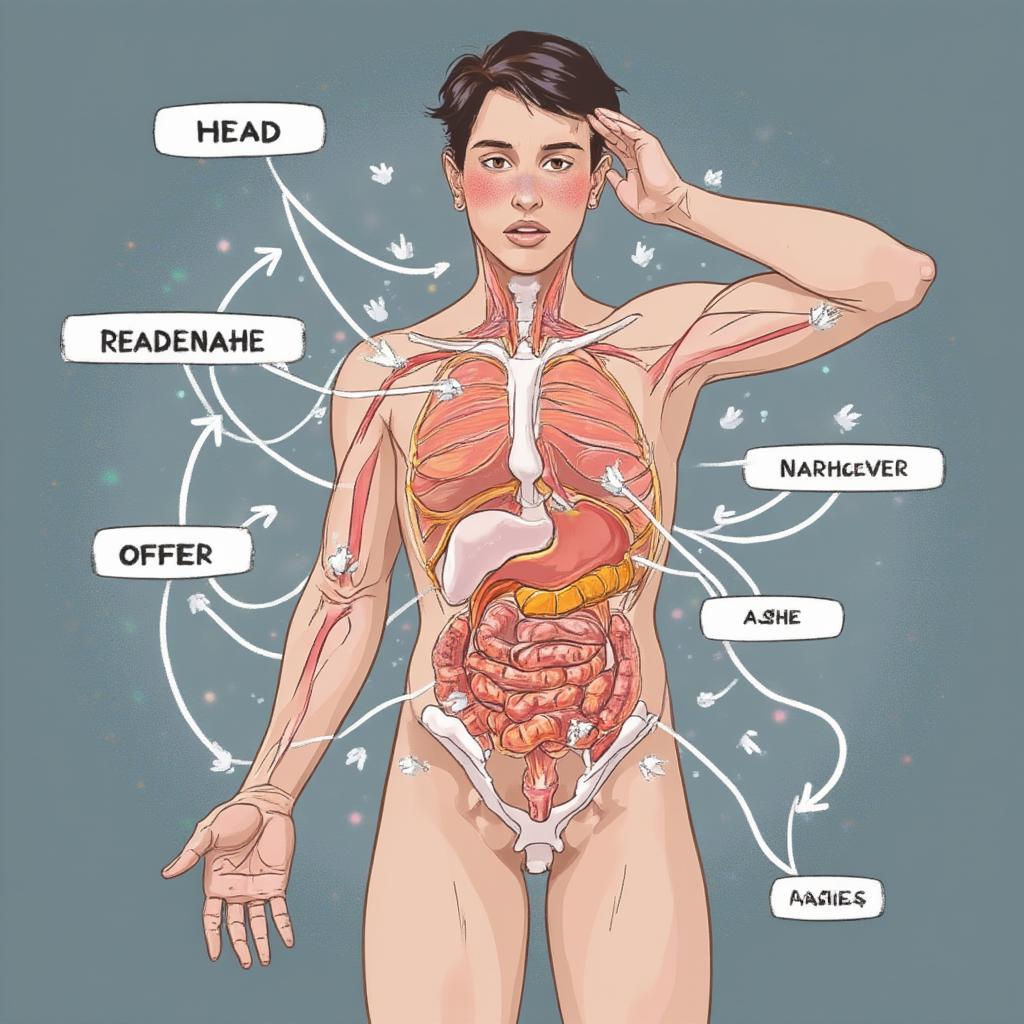The Hangover: Decoding the Morning After Mystery

The morning after a wild night out often leaves us piecing together fragmented memories, battling a throbbing headache, and asking, “What happened?” This phenomenon, commonly known as the hangover, is a complex mix of physiological reactions and bizarre occurrences. Understanding the science and strategies behind managing these unpleasant after-effects can help you navigate the morning after with a little more grace.
What Exactly is a Hangover?
A hangover isn’t simply a matter of feeling a little rough. It’s a cluster of symptoms, a symphony of bodily complaints orchestrated by the aftermath of alcohol consumption. These symptoms, ranging from the universally experienced headache to the more niche but equally unwelcome nausea, are the body’s way of saying, “Hey, we’re not exactly thrilled about that last round.” So, what’s the science behind it?
- Dehydration: Alcohol is a diuretic, meaning it makes you pee more. This leads to a loss of fluids and electrolytes, causing that infamous dry mouth and pounding headache. Think of your body as a thirsty plant wilting under the sun; it’s craving hydration.
- Acetaldehyde: This toxic byproduct of alcohol metabolism is a major player in The Hangover saga. Your liver breaks down alcohol into acetaldehyde, which is far more toxic than the alcohol itself. Your body needs time to process this and can trigger many uncomfortable symptoms.
- Inflammation: Alcohol can trigger an inflammatory response in the body. This widespread inflammation can manifest as muscle aches, fatigue, and that general feeling of malaise.
- Gut Irritation: Alcohol can irritate the lining of the stomach, leading to nausea, vomiting, and indigestion. It’s as if your stomach is staging its own mini-rebellion.
- Sleep Disruption: While you might have passed out easily, alcohol significantly interferes with sleep quality. This fragmented sleep can leave you feeling groggy and unrested.

Decoding the Different Hangover Symptoms
Hangovers aren’t one-size-fits-all. Different people experience different symptoms, and even the same person might have different hangovers on different occasions. Here are some common hangover complaints:
- Headache: The classic symptom, often caused by dehydration and blood vessel changes. It’s that persistent throb that feels like a tiny hammer is tapping your skull.
- Nausea and Vomiting: The result of gut irritation and the toxic effects of acetaldehyde. Your stomach might be doing backflips you didn’t ask for.
- Fatigue: The lingering tiredness that comes from disrupted sleep and the overall strain on your body. It’s the kind of fatigue that a strong coffee barely scratches the surface of.
- Muscle Aches: Aches and pains all over your body, often caused by inflammation. You feel like you just ran a marathon, without actually running anywhere.
- Dry Mouth: The body’s plea for hydration, a direct result of alcohol’s diuretic effect.
- Sensitivity to Light and Sound: Your senses are heightened, and the world can feel like it’s too bright and too loud.
- Trouble Concentrating: The mental fog that makes it difficult to focus, think clearly, and accomplish even simple tasks. It’s like your brain decided to take a day off.
- Increased Anxiety: Hangover anxiety, also known as “hangxiety,” is a real phenomenon. It’s a cocktail of chemical imbalances and the brain’s attempts to process the night before, making you feel jittery, uneasy, and even paranoid.
The Hangover Cure: Myth vs. Reality
Ah, the eternal search for the ultimate hangover cure! Many purported remedies circulate, often shrouded in folklore and personal anecdotes. However, not all of them are created equal. Let’s sort through the myths and realities:
- The “Hair of the Dog”: Drinking more alcohol to ease hangover symptoms may provide temporary relief, but it’s ultimately delaying the inevitable and can worsen the situation. This is a risky tactic that often leads to a deeper hole.
- Greasy Food: While a greasy breakfast might feel comforting, it won’t do much to cure a hangover. However, if it helps settle your stomach, then it can’t hurt. The fat may help in slowing the rate of alcohol absorption, but this only really works before alcohol consumption.
- Sports Drinks: Electrolyte-rich sports drinks can help replenish what you lost during dehydration, but they often contain high sugar levels, which can further upset your stomach. Water is still the best choice for rehydration.
- Painkillers: Over-the-counter painkillers like ibuprofen or aspirin can help with the headache, but they can also irritate your stomach. Acetaminophen (paracetamol) should be avoided as it can be harmful to the liver when combined with alcohol. Always consult a doctor or pharmacist for advice, especially when combining medication.
- Coffee: The caffeine in coffee can temporarily ease fatigue and headaches but can further dehydrate you. It’s a band-aid solution and not a cure.
- Water: This is your best friend! Staying well hydrated is the most effective way to tackle many hangover symptoms.
“The key to managing a hangover is understanding its underlying mechanisms,” says Dr. Eleanor Vance, a renowned biochemist specializing in alcohol metabolism. “Prioritizing rehydration, replenishing electrolytes, and allowing the body to recover are the best ways to alleviate symptoms. There is no magic cure, but some steps can provide comfort.”
Preventing the Hangover: Proactive Strategies
Prevention, they say, is better than cure, and this holds especially true for hangovers. Here are some strategies to minimize the severity of that morning-after feeling:
- Hydrate, Hydrate, Hydrate: Drink plenty of water before, during, and after consuming alcohol. Alternating alcoholic drinks with water is a golden rule.
- Eat Before You Drink: Having food in your stomach slows down alcohol absorption, giving your body more time to process it. Think protein and healthy fats, not just greasy snacks.
- Pace Yourself: Limit the number of drinks you consume per hour. Slow and steady wins this race. Avoid rapid consumption or “shots”.
- Choose Your Drinks Wisely: Some alcoholic beverages are more likely to cause hangovers. Darker liquors often contain higher levels of congeners, which are chemical byproducts that can contribute to hangover symptoms. Opt for lighter options like vodka or gin.
- Know Your Limits: Everyone has a different tolerance for alcohol. Pay attention to your body and stop when you start feeling the effects. It’s better to call it a night than to end up regretting it in the morning.
- Replenish Electrolytes: Incorporating electrolyte-rich drinks or foods before or during consumption might be helpful. Coconut water or sports drinks can be good options.
Specific Techniques for Morning Recovery
Okay, so despite your best efforts, the hangover has landed. What now?
- Rehydrate Immediately: Start your day by drinking plenty of water. This is the most crucial step to recovery. Add some electrolytes if you have them.
- Rest: Allow your body the time to recover. Sleep or relax in a quiet, comfortable space.
- Eat a Nutritious Meal: Opt for easily digestible foods like toast, bananas, or oatmeal. These will replenish lost nutrients and help settle your stomach.
- Gentle Exercise: A light walk or some gentle stretching can help improve circulation and alleviate aches. Avoid strenuous exercise.
- Fresh Air: Get some fresh air to help clear your head and feel more alert.
- Consider Herbal Teas: Ginger or peppermint teas can help settle your stomach and ease nausea.
“The morning after can be challenging, but focusing on recovery is key,” states Dr. Mateo Ramirez, a holistic health expert. “Prioritizing hydration, nutrient-rich foods, and rest allows the body to naturally heal. Avoid stressing and give yourself the time you need to feel better.”
Hangover and Welcome Shock Naue: A Cinematic Perspective
Now, bringing this back to Welcome Shock Naue, the hangover provides a fascinating lens for exploring themes of consequence, memory, and the often-surreal moments following intense experiences. In our cinematic world, the hangover isn’t just a physical state, it’s a narrative device. It’s the messy, chaotic aftermath that reveals character flaws, hidden truths, and unexpected connections. The disorientation and fragmented memories of a hangover can be a powerful storytelling tool, offering a unique window into the psyche of our characters. Our films can often use it to portray an abstract feeling of being lost, confused or disoriented. The physical discomfort of the hangover, with its pounding headaches and nauseating sensations, can serve as a stark reminder of the character’s actions and choices. The aftermath of excessive consumption, often resulting in a physical and mental slump, can act as a visual metaphor for a character’s own descent into chaos or self-destruction, while a careful attention to all the small details will create an environment filled with dread and mystery. The sudden clarity after a particularly bad hangover can be a powerful moment of realization or change for a character, a metaphorical awakening.
The creative and nuanced handling of the ‘hangover’ concept in our visual narrative will make it more meaningful and relatable. The universal experience of “the morning after” will resonate with a diverse audience, while the unique elements of our cinematic universe will add depth and layers to the interpretation of this familiar feeling. We aim to portray hangovers in a realistic yet stylized way, exploring both the physical and psychological aspects of it, ensuring it’s not just a comedic trope but a powerful element of storytelling. The sound design will also play an important role in creating the atmosphere of the “morning after”, by using subtle sound effects to amplify the physical discomfort and mental disorientation associated with hangovers.
Conclusion: Navigating the Hangover
The hangover, a complex and often unpleasant phenomenon, is a direct consequence of alcohol consumption. While there’s no magic cure, understanding the science behind it and employing proactive strategies can significantly minimize its impact. By prioritizing hydration, pacing your consumption, and choosing your drinks wisely, you can reduce the frequency and intensity of the morning-after misery. Remember that your body needs time to recover, so rest and gentle care are your best allies. Within our Welcome Shock Naue universe, we see the hangover as more than just a physical state; it’s a reflection of our choices, a window into our characters’ inner turmoil, and a key element in crafting immersive and resonant narratives. The hangover, in all its messy glory, offers a rich opportunity to explore human vulnerability and the consequences of our actions.
Frequently Asked Questions (FAQ)
Q1: How long does a hangover typically last?
A: A hangover can last anywhere from a few hours to a full day, depending on the amount of alcohol consumed, individual metabolism, and other factors.
Q2: Is there a difference in hangovers from different types of alcohol?
A: Yes, darker liquors like whiskey and red wine tend to cause more severe hangovers due to higher levels of congeners. Lighter liquors like vodka and gin usually lead to less severe symptoms.
Q3: Does eating before drinking really help prevent a hangover?
A: Yes, eating a meal, especially one rich in protein and healthy fats, helps slow down alcohol absorption into your bloodstream, thus reducing the severity of a hangover.
Q4: Can taking painkillers before bed prevent a hangover?
A: Taking painkillers before bed is not recommended as it can mix dangerously with alcohol. Take them only after you wake up, and avoid acetaminophen, opt for ibuprofen or aspirin instead.
Q5: How does dehydration contribute to a hangover?
A: Alcohol is a diuretic, meaning it makes you pee more frequently. This leads to dehydration and a loss of electrolytes, causing symptoms like headaches, fatigue, and dry mouth.
Q6: Are there any specific foods that can help with a hangover?
A: Easily digestible foods like toast, bananas, oatmeal, and broth can help replenish nutrients and settle your stomach after drinking.
Q7: What is “hangxiety”?
A: “Hangxiety,” or hangover anxiety, is an increased level of anxiety and unease often experienced after a night of drinking, stemming from chemical imbalances in the brain and a processing of memories from the previous night.
Q8: Can exercise help with a hangover?
A: Gentle exercise, like a walk, can improve circulation and alleviate aches, but avoid strenuous exercise. Rest and hydration are still the priority.
Q9: What is the best way to rehydrate after drinking?
A: Plain water is always the best choice, with the addition of electrolytes like sports drinks can further aid rehydration.




